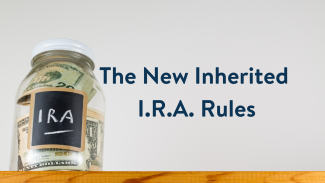
The New Inherited I.R.A. Rules
by Brandon Miller on Mar 10, 2021
New inherited I.R.A. rules took effect on January 1, 2020. The Setting Every Community Up for Retirement Enhancement (SECURE) Act became law on that day, altering the regulations on inherited Individual Retirement Account (I.R.A.) distributions.
The big change: the introduction of the 10-year rule for beneficiaries. Most people who inherit an I.R.A. now have to empty that I.R.A. of assets within ten years of the original owner's death. You can do this as you wish; you can withdraw the whole I.R.A. balance at once, or take incremental distributions on the way to meeting the 10-year deadline.1
Remember that tax rules constantly change. There is no guarantee that the tax treatment of Roth and Traditional I.R.A.s will remain what it is now. This article is for informational purposes only. If you have inherited or expect to inherit a traditional or Roth I.R.A., be sure to consult a financial professional for real-world advice.
Are there exceptions to this rule? Yes. If the deceased I.R.A. owner was your spouse, you can treat the inherited I.R.A. like an I.R.A. of your own. If it is a traditional I.R.A., you generally must take required minimum distributions (R.M.D.s) from it once you reach age 72. The I.R.S. taxes those distributions as regular income, and if you take any distributions before age 59½, they may be subject to a 10% federal income tax penalty. If it is a Roth I.R.A., you aren't required to take R.M.D.s. (You may continue to contribute to a Traditional I.R.A. past age 72 as long as you meet the earned-income requirement.)1
Certain non-spousal I.R.A. beneficiaries still have the chance to "stretch" inherited I.R.A. distributions over their remaining lifetimes, using Internal Revenue Service formulas (a choice available to most I.R.A. beneficiaries before 2020). You may choose this option if you are less than ten years younger than the original I.R.A. owner. You can also elect to do this if you meet the SECURE Act's definition of a "disabled" or "chronically ill" individual (you have a life-altering physical or mental impairment or require extended care).1,2
Lastly, if a child inherits an I.R.A., they can take distributions based on the child's life expectancy until the age of 18, at which point the aforementioned 10-year rule applies.1
If you are a Roth I.R.A. beneficiary, be aware of the 5-year rule pertaining to Roth I.R.A.s. If you inherit a Roth I.R.A. that is less than five years old at the time of the original owner's death, any earnings taken from it will count as taxable income. If the Roth I.R.A. is more than five years old, you can take tax-free distributions from the earnings. Assets representing the original owner's Roth I.R.A. contributions can become tax-free distributions regardless of when the original owner opened the Roth I.R.A.1
What's the big takeaway from all this? Suppose you are relatively young and anticipate a large I.R.A. inheritance, and that big I.R.A. is a traditional I.R.A. In that case, you can anticipate greater income taxes during the 10-year window when you take those inherited I.R.A. distributions.
By the way, the new rules do not apply to inherited I.R.A.s whose initial owners died prior to 2020. If you are a beneficiary of such an I.R.A., then you may still attempt to "stretch" the inherited I.R.A. assets according to I.R.S. life expectancy formulas and take R.M.D.s as required by the old rules.3
This material was prepared by MarketingPro, Inc., and does not necessarily represent the views of the presenting party, nor their affiliates. This information has been derived from sources believed to be accurate. Please note - investing involves risk, and past performance is no guarantee of future results. The publisher is not engaged in rendering legal, accounting or other professional services. If assistance is needed, the reader is advised to engage the services of a competent professional. This information should not be construed as investment, tax or legal advice and may not be relied on for the purpose of avoiding any Federal tax penalty. This is neither a solicitation nor recommendation to purchase or sell any investment or insurance product or service, and should not be relied upon as such. All indices are unmanaged and are not illustrative of any particular investment.
Brio Financial Group is a registered investment adviser. Advisory services are only offered to clients or prospective clients where Brio Financial Group and its representatives are properly licensed or exempt from licensure. No advice may be rendered by Brio Financial Group unless a client service agreement is in place.
Citations:
1. NerdWallet, November 25, 2020
2. FedWeek, March 3, 2020
3. Forbes, October 28, 2020
